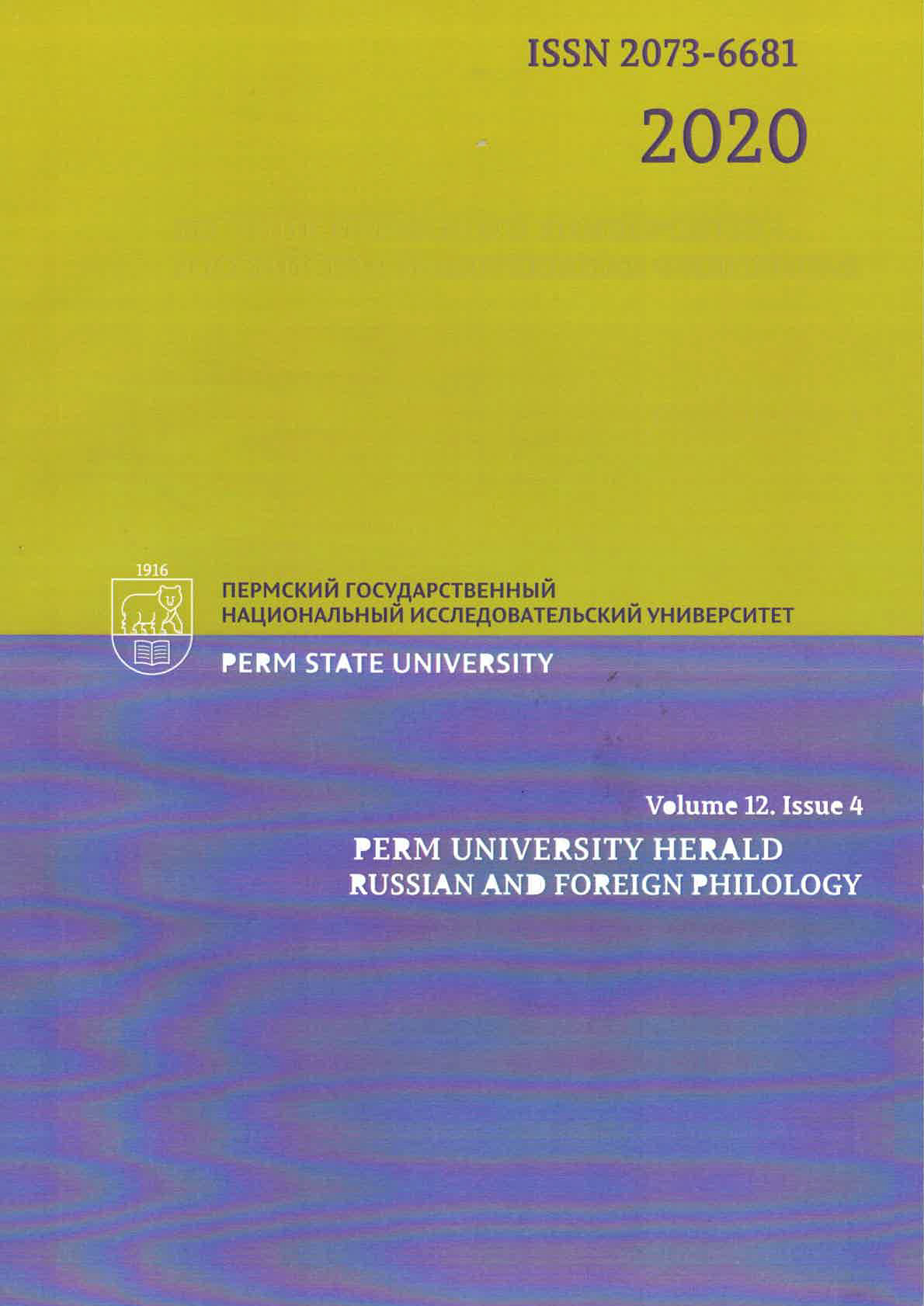THE SEARCH FOR THE PHILOSOPHICAL FOUNDATIONS OF HUMAN EXISTENCE IN R. GOLDSTEIN’S NOVEL ‘THE MIND-BODY PROBLEM’
DOI:
https://doi.org/10.17072/2073-6681-2020-4-107-116Keywords:
Rebecca Goldstein, philosophical novel, dualism, Descartes, Spinoza, Malebranche.Abstract
The research examines the main problems raised in Goldstein’s philosophical novel. The paper aims to reveal how the creation of the characters and the development of the plot in accordance with the philosophical theories of Descartes, Malebranche and Spinoza allow the writer to explore the metaphysical and ethical consequences of following their philosophical ideas in everyday life. Applying the comparative method of analysis to the novel and the classical philosophical texts, the author of the study interprets the text of the novel, rich in symbols and intentionally foregrounded details, and discloses the artistic means used for creating the opposition of the material and the spiritual. Primarily, the confrontation becomes apparent in the image of the central character and her persistent inner conflicts between the rational and the emotional, the publicly displayed and the internal, the objective and the subjective. The main character’s failure to achieve life harmony by a mechanical combination of heterogeneous principles is viewed as a crucial detail, with the help of which the writer strives to emphasize the inconsistency of the dualistic worldview in general. One of the possible ways to overcome philosophical dualism is found in Malebranche’s philosophy, in which the gap between the material and the spiritual is bridged by their unification in the idea of the primary rational source; however, the concept does not look impeccable, with too much emphasis given to the mind at the expense of the body. The main opportunity to achieve harmony and moral progress is finally associated with Spinoza’s philosophical guidelines, which not only assert the importance of the rational cognitive principles and common sense but also demonstrate practical ways to combine freedom and care for another person, emotions and reason.References
Список литературы
Агеносов В. В. Избранные труды и воспоминания. М.: АИРО-XXI, 2012. 704 с.
Декарт Р. Сочинения в 2 т.: пер. с лат. и франц. / сост., ред., вступ. ст. В. В. Соколова. М.: Мысль, 1989. Т. 1. 654 с.
Кротов А. А. Мальбранш и картезианство. М.: Изд-во Моск. ун-та, 2012. 320 с.
Никулина А. К. «Вырваться за пределы языка»: речь и молчание в романе Д. Ф. Уоллеса «Бесконечная шутка» // Вестник Томского государственного университета. Филология. 2020. № 63. С. 235–249.
Спиноза Б. Этика / пер. с лат. Я. М. Боровского, Н. А. Иванцова. СПб.: Азбука, Азбука-Аттикус, 2013. 352 с.
Goldstein R. Sell Descartes, Buy Spinoza // Prospect. 2011. May 25. URL: https://www.prospectmagazine.co.uk/magazine/sell-descartes-buy-spinoza (дата обращения: 24.06.2020).
Goldstein R. The Mind-Body Problem. New York: Penguin Books, 1993. 275 p.
Goldstein R. The Fiction of the Self and the Self of Fiction // The Massachusetts Review. 2006. Vol. 47. No. 2. P. 293–309.
Goldstein R. Why I’ve Learned to Love the Novel // New Scientist. 2007. August 25. P. 46–47.
Goldstein R. Writers on Writing: Carried from the Couch on the Wings of Enchantment // New York Times. 2002. December 16. URL: https://www.rebeccagoldstein.com/content/writers-writing-carried-couch-wings-enchantment (дата обращения: 24.06.2020).
Goldstein R., Pinker S. The Seed Salon // Seed. 2004. Summer. URL: https://www.rebeccagoldstein.com/files/rgoldstein/files/2004_08_salon.pdf (дата обращения: 24.06.2020).
Lang J. An Interview with Rebecca Goldstein // Contemporary Literature. 2008. Vol. 49. No. 1. P. 1–23.
Norman A. The Machinery of Moral Progress: An Interview with Rebecca Newberger Goldstein // Humanist. 2014. August 27. URL: https://thehumanist.com/magazine/september-october-2014/features/the-machinery-of-moral-progress-an-interview-with-rebecca-newberger-goldstein (дата обращения: 24.06.2020).
Seebohm C. Husbands, Lovers and Parents // New York Times. 1983. September 25. Section 7. P. 14.
Sosis C. What Is It Like To Be a Philosopher? An interview with R. Goldstein. 2019. October 10. URL: http://www.whatisitliketobeaphilosopher.com/#/rebecca-goldstein (дата обращения: 24.06.2020).
References
Agenosov V. V. Izbrannye trudy i vospominaniya [Selected works and memoirs]. Moscow, AIRO-XXI Publ., 2012. 704 p. (In Russ.)
Descartes R. Sochineniya: v 2 t. [Works in 2 vols.]. Transl. from Latin and French. Comp., ed., introd. by V. V. Sokolov. Moscow, Mysl’ Publ., 1989, vol. 1. 654 p. (In Russ.)
Krotov A. A. Mal’bransh i kartezianstvo [Malebranche and Cartesianism]. Moscow, Moscow University Press, 2012. 320 p. (In Russ.)
Nikulina A. K. ‘Vyrvatsya za predely yazyka’: rech’ i molchanie v romane D. F. Wallasa ‘Beskonechnaya shutka’ [‘To run against the boundaries of language’: speech and silence in D. F. Wallace’s ‘Infinite Jest’]. Vestnik Tomskogo gosudarstvennogo universiteta. Philologiya [Tomsk State University Journal of Philology], 2020, issue 63, pp. 235–249. (In Russ.)
Spinoza B. Etika [Ethics]. Transl. from Latin by Ya. M. Borovskiy, N. A. Ivantsov. St. Petersburg, Azbuka Publ., Azbuka-Artticus Publ., 2013. 352 p. (In Russ.)
Goldstein R. Sell Descartes, buy Spinoza. Prospect, 2011, May 25. Available at: https://www.prospectmagazine.co.uk/magazine/sell-descartes-buy-spinoza (accessed 24.06.2020). (In Eng.)
Goldstein R. The Mind-Body Problem. New York, Penguin Books, 1993. 275 p. (In Eng.)
Goldstein R. The fiction of the self and the self of fiction. The Massachusetts Review, 2006, vol. 47, issue 2, pp. 293–309. (In Eng.)
Goldstein R. Why I’ve learned to love the novel. New Scientist, 2007, August 25, pp. 46–47. (In Eng.)
Goldstein R. Writers on writing: Carried from the couch on the wings of enchantment. New York Times, 2002, December 16. Available at: https://www.rebeccagoldstein.com/content/writers-writing-carried-couch-wings-enchantment (accessed 24.06.2020). (In Eng.)
Goldstein R., Pinker S. The seed salon. Seed, 2004, summer. Available at: https://www.rebeccagoldstein.com/files/rgoldstein/files/2004_08_salon.pdf (accessed 24.06.2020). (In Eng.)
Lang J. An interview with Rebecca Goldstein. Contemporary Literature, 2008, vol. 49, issue 1, pp. 1–23. (In Eng.)
Norman A. The machinery of moral progress: An interview with Rebecca Newberger Goldstein. Humanist, 2014, August 27. Available at: https://thehumanist.com/magazine/september-october-2014/features/the-machinery-of-moral-progress-an-interview-with-rebecca-newberger-goldstein (accessed 24.06.2020). (In Eng.)
Seebohm C. Husbands, lovers and parents. New York Times, 1983, September 25, Section 7, p. 14. (In Eng.)
Sosis C. What is it like to be a philosopher? An interview with R. Goldstein. 2019, October 10. Available at: http://www.whatisitliketobeaphilosopher.com/#/rebecca-goldstein (accessed 24.06.2020). (In Eng.)




